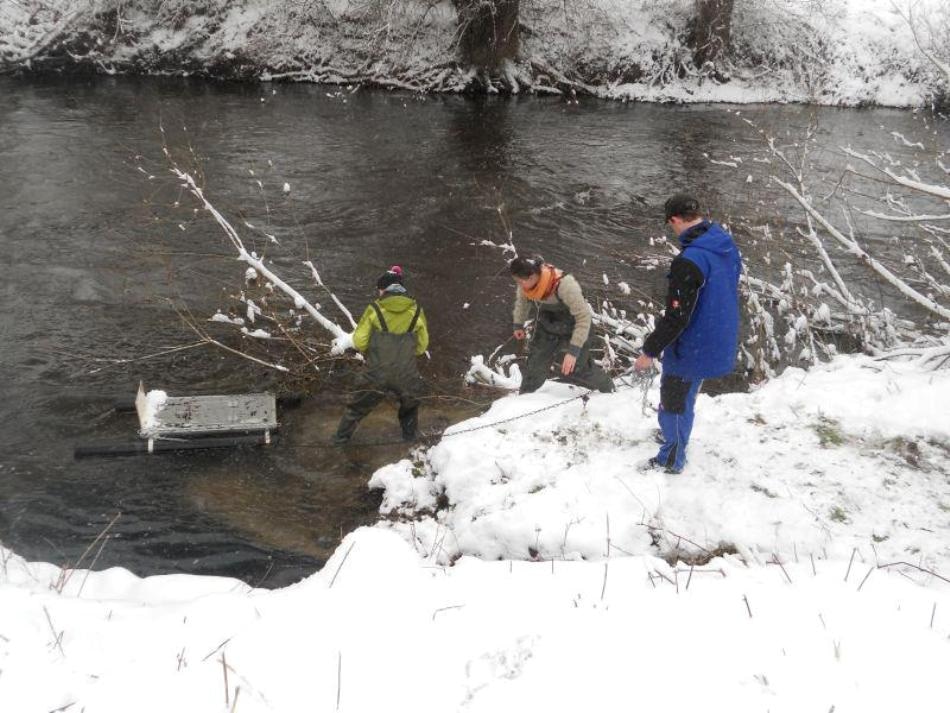Jul 27 2018
Aquatic organisms could be endangered even by trivial amounts of toxins in lakes and rivers. In the recent years, the public has turned out to be more aware of this environmental issue. Trace amounts of toxins observed in waterways are included in various things used by people every day- washing powder, dishwasher tablets, and shower gel - and also pesticides, cosmetics, and pharmaceuticals.
 Scientists taking samples from the fish in the cage. (Image credit: Rita Triebskorn)
Scientists taking samples from the fish in the cage. (Image credit: Rita Triebskorn)
These substances are also included in household wastewater and are transferred to wastewater treatment plants, where traditional methods do not have the potential to totally eliminate or degrade them. The treated wastewater that flows into the streams takes the toxins with it. A team of scientists led by Professor Rita Triebskorn from the University of Tübingen’s has been analyzing the impacts of different wastewater treatment methods on the health of fish. The researchers, from the Institute of Evolution and Ecology (EvE), discovered that the method of wastewater treatment has to be determined on a case-by-case basis, based on the composition of toxins in the wastewater. Their research has been reported in the Environmental Sciences Europe journal.
In the case of traditional wastewater treatment plants, the wastewater from private households and industry runs through biological, mechanical, and chemical purification stages. Supplementary stages with ozonization or activated carbon are largely being included as a fourth purification stage.
As part of an investigation on Lake Constance we were able to show that trace toxins can be effectively removed with an additional stage of powdered activated carbon, and that the health of aquatic organisms in the area clearly improves. But until now there have been relatively few studies on the long-term success of improved wastewater treatment on water ecosystems.
Professor Rita Triebskorn
Standardized Experimental Conditions
In their comparative experiments, the scientists analyzed three traditional wastewater treatment plants, one of which, the Langwiese plant in the Ravensburg district, had an activated carbon stage installed at the time of the research. The biologists positioned cages into the water over and underneath the place at which treated water from the plant flowed into the river.
Compared with the examination of wild fish, this has the advantage that we can standardize the fish characteristics such as age, diet and stage of development. This means we can better recognize any effects on the health of the animals.
Sabrina Wilhelm, Team Member & Corresponding Author
Conventional techniques were adopted to discover whether the cell nuclei of rainbow trout exhibited signs of increased genotoxicity. Moreover, the livers of the fish were investigated to determine whether they had to work more and more to break down or eliminate toxins.
Case-by-Case Decisions
While we didn’t find negative effects of trace toxins on fish health in one of the conventional water treatment plants, the rainbow trout below the second conventional plant had much higher critical liver values. We also saw these negative effects at the Langwiese plant before the installation of the fourth stage.
Sabrina Wilhelm, Team Member & Corresponding Author
She further stated that the activated carbon stage evidently decreased the high liver values and the genotoxicity in the fish.
“Investing in modern water purification techniques are a boon to aquatic ecosystems particularly when conventional technologies don’t do enough to reduce the levels of toxins,” stated Rita Triebskorn. “However, depending on the composition of the wastewater, negative effects on aquatic organisms can also be reduced by optimizing conventional wastewater purification.”
The underlying fact is that it would be worth investing in optimal wastewater purification for sustainable protection of our environment.